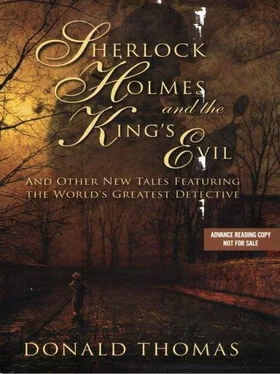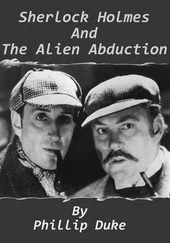My friend unceremoniously tore a page from the “1855” copy of Cleon. He positioned it on the stage of the microscope and adjusted the lens. Then he made way for the young man to sit down at the table.
“Ignore the printing, if you can, Mr Browning. Look at the paper itself. What do you see?”
“Nothing, except that it is magnified and therefore appears more speckled than paper normally is.”
“Will you please concentrate on the pale yellow specks. Some of these you can ignore for the moment. One or two, however, will show what appear to be rather like fine hairs. Do you see them?”
“Yes,” said the young man uncertainly and then, more confidently, “Yes, I do.”
“Leaves of grass,” said Holmes magisterially, “The words used by Augustus Howell as he lay dying, whether or not his throat was cut.”
“The poems of Walt Whitman!” I said at once.
“I think you may take it, Watson, that this has nothing to do with Mr Whitman. It has everything to do with esparto grass, of which paper-makers in England nowadays use a great deal. I choose the word ‘nowadays’ advisedly. Until 1861, paper in England always consisted of rags. The cotton shortage caused by the American Civil War made this impossible. Other ingredients were then substituted.”
“In other words…”
“In other words,” said Holmes finally, “the Sonnets printed in 1847 at Reading-as well as the 1855 copy of Cleon-and the manuscript of Savonarola dated 1855-all of them are on paper not manufactured until Thomas Routledge of Eynsham Mills near Oxford first used esparto grass in 1861. Indeed, in my view the true reason that your father could not have been the author of Savonarola is that he was already dead when it was written. The same applies to the so-called rough drafts of his letters to your mother. By trickery or dishonesty, something of the genuine letters reached a forger who has built most shamelessly on that in an attempt to enrich himself.”
There was silence in the tiled room with the bright sun outside and the quiet splash of a gondolier’s oar in the shady waters of the canal. Pen Browning looked cautiously at Holmes.
“Let me have this clearly, sir, you are talking of…”
“Fraud,” said Holmes exuberantly, “on an outrageous and preposterous scale. Indeed, though esparto grass had been available since 1861, I would suggest that this is a very recent fraud, committed within the past few months. More specifically, those who committed it could only do so in safety once your father was dead.”
“But you talked of 1861, Mr Holmes, almost thirty years ago. My father lived until last December.”
“Very well,” said Holmes patiently, “If you will look through the microscope again, you may be able to see similar specks in the paper. However, they lack the fine hairs of the esparto leaves. These other specks are traces of chemical wood. During its manufacture, this sheet of paper with its date of 1855 has passed through a mill where it was in contact with such pulp. However, the first use in England of chemical wood in paper for printing was in 1873. In the form we have it here, it was unknown to us until about five years ago. Taking all the evidence, including the likelihood that had your father still been alive he would have denounced the poem about Savonarola as a fraud, the date of this manuscript is almost certainly not six months ago.”
“And the letters, Mr Holmes?”
“They are written on the same paper. The forger-or impostor in the case of the letters-was prepared to take a chance. Having acquired forged copies of these books which had been accepted as genuine in their dates, he thought himself safe in cutting out fly-leaves on which to compose forged documents.”
“Can you be certain that so many of these books are forgeries?”
Holmes sighed.
“I will tell you what I am certain of, Mr Browning. The rare 1847 edition of your mother’s Sonnets contains traces of chemical wood and, on that evidence, must have been printed more than thirty years later. Her poem The Runaway Slave, in what purports to be a first edition of 1849, contains a modern form of the letters ‘f’ and ‘j’ cast as type for the printer Richard Clay in 1880 and never used before then.”
Pen Browning looked dumbfounded, there was no other word for it.
“It is a conspiracy, Mr Holmes! Nothing less.”
Holmes brushed this aside.
“Among the other rare editions, the paper used for the so-called first edition of Tennyson’s Morte d’Arthur in 1842 has the 1880 type as well as esparto grass and chemical wood. The same is true of Mr Swinburne’s Dolores which purports to be a first rare printing of 1867. There are multiple copies of all the volumes to be found on these shelves and in these cupboards, ready to be slipped into book auctions. A small fortune if they could be sold as genuine to J. P. Morgan and his rivals. However, Lord Tennyson and Mr Swinburne are still alive, therefore they must wait a little. Your parents were, for the forgers, conveniently dead-as indeed was Lord Byron. Even if a manuscript forgery was skilful enough, it was important that whoever was supposed to have written it was no longer alive to deny the claim. Meantime, such treasures of Byron and Beckford, of Elizabeth Barrett and Robert Browning, would make a fortune for the criminal. This, believe me, was only a beginning.”
“And Mr Howell?”
“We are advised by that estimable weekly paper The Winning Post and Sportsman’s Weekly that he has indeed been gathered to his fathers.”
“With his throat cut?”
“I should take the liberty of doubting that. I think it more likely that when he was taken into the Home Hospital in Fitzroy Square-with pneumonia shall we say?-he seized the chance of putting about a story that would deter his creditors once and for all. Unfortunately for him and, I imagine, rather to his own surprise he then succumbed in reality to this pneumonia. I rather think he is now beyond justice of the sort administered by judges of the Central Criminal Court.”
“It was not revenge of some kind?” I asked,
Holmes shook his head.
“As for the coin wedged between his teeth, you may forget the underworld of Naples. More probably, the loyal fingers of Rosa Corder or some other classically-minded acquaintance placed it there to pay Charon the ferryman for the crossing of the Styx into Hades.”
“And the cutting of the throat was an incision in the trachea to the bronchial tubes to assist his breathing?” I asked sceptically.
“It would not be unknown.”
Pen Browning interrupted.
“What of the volume of Sonnets in his pocket?”
“I believe that was there,” said Holmes quietly, “However great Howell’s avarice, it was mixed with a very large dash of vanity. Hence the stories of having dived for treasure on a sunken galleon, having been sheikh of a Moroccan tribe, and indeed of being attaché at the Portuguese embassy in Rome. Perhaps he knew that his last moment had come and he certainly knew that those who had attended him would have found the ‘1847’ Sonnets in his pocket.”
“That would convict him of nothing.”
“There is a certain type, Mr Browning, whose greatest pleasure is in boasting of his tricks. He is like the murderer who taunts the police with ‘Catch me if you can.’ He puts his neck in the noose and snatches it out again.”
“And Howell?”
“‘Leaves of grass,’ which I can well believe were his last words, was not a reference to Mr Whitman but to the Sonnets. Esparto grass. The world had been tricked. But where was the fun unless, before he died, he could tell the world how cleverly it had been tricked?”
“He was not murdered after all?”
“His killer was far more likely to be a meek and merciless little microbe, thriving on the fermentation in his lungs, than the agent of a Neapolitan criminal gang. The story of underworld vengeance has too much of Gussie Howell about it to be believed.”
Читать дальше












